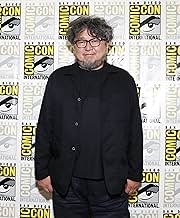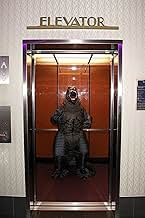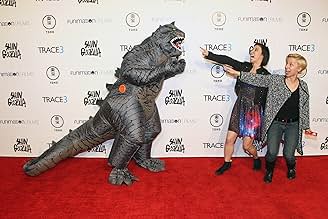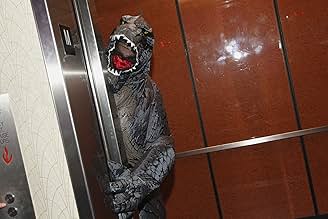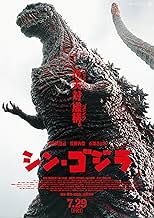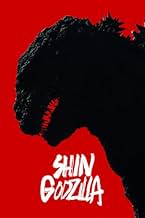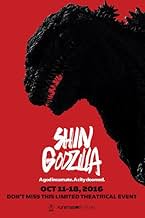- Premi
- 13 vittorie e 10 candidature totali
Recensioni in evidenza
This is an excellent show that differs from the standard hack-and- slash and action-driven natures of other recent films (Independence Day 2 etc.). It is one of the most narrative-driven films that I've watched in the last 2 years.
PROS:
CONS
CONCLUSION:
PROS:
- The acting was great as a whole, comprising of much seriousness and focus, typical of the exigency of a nation-wide disaster, in the top politicians of the diet.
- It is full of political irony, satire of the Japanese government's and bureaucracy's indecision and red-taping. There is great intelligence imbued into movie, and it shows that much research has been done prior to filming. It also shows the way in which foreign and indigenous affairs have been interwoven together in governmental decision-making. I greatly appreciate this as a whole, as the narration is full of meaning and subtlety.
- The special effects of Godzilla were absolutely wonderful, portraying both scale and grandeur in Godzilla's size and style. I greatly enjoyed the four main scenes where Godzilla made its appearance, especially its climax at the latter two.
- The pacing was fast-paced, and little time was wasted. A lot of content had been packaged into a duration of just 120 minutes. While watching, I thought that the film lasted for 4 hours, as there were so many occurrences!
- The style and pace also remains true to the original Godzilla classics. So is the provenance of Godzilla.
CONS
- Ishihara would not have fooled us into thinking that she is a Japanese-American English speaker!
- Overall, it is very dialogue-heavy. This is both a strength and weakness. A strength as there is much character development, but also excessive to the point that it sometimes can be dreary and draggy. This is the greatest setback of the film, and could have been further streamlined. Minus 1 star for this.
CONCLUSION:
- As a whole, I rate it 9 out of 10, and will watch it again.
- Most people who have an appreciation for subtlety and nuance, and also of vivid storytelling will like this film.
- However, those who prefer a CGI roller-coaster like Independence Day 2 or 2012 may be turned off by the extremely heavy dialogue.
This movie, hands down, is one of the best representations of Godzilla. I recommend you watch in sub for the best experience because the audio mixing isn't the greatest for the English dub, and trust me, it's noticeable. Suck it up if you don't like to read. I mean, you're reading now, aren't you? Godzilla ultimately steals the show, and you'd hope so from a Godzilla movie. The visuals at times can be shoddy, but in the scenes where the lighting is just right, it's a glorious moment to behold truly horrifying visuals (in a good way). The plot, however, is where it kind of suffers the most for me.
The film takes a somber, serious tone as to what would happen if Japan were attacked -- in this case, by a seemingly unstoppable foe.
At present in Japan, there is an ongoing debate as to whether or not Japan should amend it's constitution to allow for an offensive military and this Godzilla film plays to exactly how powerless Japan would be in making it's own decisions during an attack of any kind. The reality is that the Japanese Prime Minister would have to ask for permission from the United States President before making an offensive move against a foreign threat and this film plays to that hard reality.
This new Godzilla starts out as an homage to its former man in a monster suit so that when you first see Godzilla, you'll disbelieve what you're seeing, but this Godzilla evolves into something majestic and utterly awe inspiring in its power.
What's more, this film makes it clear people die. In the Japanese release there's a lot of word play about how the government officials up high (on the fifth floor) make decisions that get passed down to people on lower floors that eventually hurt the people. I'm not sure how much will be translated, but the film is deliberately showing the disconnect between the political and day to day realities.
Overall, the performances are good. There is one character who they, for whatever reason, decided to make speak English in odd an inappropriate times.
This isn't a film for US audiences. The aesthetics will turn off a lot of non-Japanese young people accustomed to CG reality. But if you're open to learning about another culture, this is an excellent film, one of the best kaiju-films you'll ever see.
At present in Japan, there is an ongoing debate as to whether or not Japan should amend it's constitution to allow for an offensive military and this Godzilla film plays to exactly how powerless Japan would be in making it's own decisions during an attack of any kind. The reality is that the Japanese Prime Minister would have to ask for permission from the United States President before making an offensive move against a foreign threat and this film plays to that hard reality.
This new Godzilla starts out as an homage to its former man in a monster suit so that when you first see Godzilla, you'll disbelieve what you're seeing, but this Godzilla evolves into something majestic and utterly awe inspiring in its power.
What's more, this film makes it clear people die. In the Japanese release there's a lot of word play about how the government officials up high (on the fifth floor) make decisions that get passed down to people on lower floors that eventually hurt the people. I'm not sure how much will be translated, but the film is deliberately showing the disconnect between the political and day to day realities.
Overall, the performances are good. There is one character who they, for whatever reason, decided to make speak English in odd an inappropriate times.
This isn't a film for US audiences. The aesthetics will turn off a lot of non-Japanese young people accustomed to CG reality. But if you're open to learning about another culture, this is an excellent film, one of the best kaiju-films you'll ever see.
Japan is back in the game with their very own new Godzilla movie SHIN GOJIRA. Where Hollywood revived Godzilla as a tribute to his more heroic role in the late-showa era "versus" movies and the Heisei era, Toho Japan has gone back to the roots of the 1954 original Gojira and crafted a modern thriller about the horrors of mankind's misdeeds, the inaction of a government embroiled in bureaucracy and the impotence of a military in the face of this fiercer, meaner, force of nature Godzilla. .
SHIN GODZILLA is likely the first Godzilla movie to focus squarely on the political scene within the government when a giant monster attacks. Past movies have always involved Scientists, soldiers, or civilians focusing on the chaos on the ground. This movies looks into the chaos at the top as we follow young civil servant Yaguchi, deputy chief cabinet secretary (the first in a long list of designations to come).
A regular day in the government is interrupted by the collapse of the Tokyo bay aqua line tunnel and mysterious attacks off the coast of Japan. While the aged officials hold fruitless meeting after meeting in an obvious parody of real life bureaucratic process, Yaguchi theorists that the disasters are caused by a living creature.
No sooner is his theory shot down than an enormous tail rises out of the water. As the government scrambles but always falling a step behind the escalating disaster, Yaguchi forms a task force of unorthodox civilian experts to figure out how to stop this creature.
As the government's tried and tested efforts become increasingly futile, USA sends a special envoy Kayako Ann Patterson with the promise of military aid and insider knowledge to this mysterious creature dubbed "Godzilla".
The creature is growing, mutating, and taking on increasingly dangerous characteristics. Yaguchi's team is forced to think outside the box for a new way to halt its rampage before the UN deploys nuclear weapons on Japanese soil.
Contrary to the trailers, this is not the dark depressing disaster movie that was promised. Instead we are treated to one of the smartest and most biting social and political satires in modern cinema. Right in the crosshairs is the inefficient bureaucratic processes of the government and their obsession with trivial minutia which results in a complete mishandling of the crisis posed by the constantly evolving Godzilla.
The satire comes in the fact that the film does not overly dramatize anything; what you see is as close to reality as one can get in an old fashion parliamentary government like Japan's. Each ministry out for itself, passing the buck wherever possible, defending only their own interests. Standard procedures take precedence over unconventional methods.
Scenes of the prime minister making an announcement of Godzilla not being able to come ashore, intercut with the revelation that not only has the creature made landfall but has started trashing the town, hearkened back to the perceived mishandling of past real life disasters in Japan.
Yet the message underlying this movie is not a strict criticism of the government but an affirming call to action aimed at a new generation of leaders to unite a nation. Where the traditional methods fail, innovation and initiative will be the true weapons of the future. Yaguchi and his team represent this perfectly; outcasts from their respective fields because of their unconventional ideas.
Their tenacity in the face of hopeless defeat soon inspires fellow citizens from all walks of life, engineers, mechanics, construction workers and other blue collar roles typically overlooked by a status obsessed people, to come together and stand against a God incarnate.
The titular monster is unlike any incarnation ever seen. It's keloid looking skin, seemingly torn in places, gives the impression of pure suffering. Yet his inhuman all staring eyes betray a being devoid of soul. It is as it was back in 1954; a soulless unstoppable force birthed from mankind's sins. The military is powerless, though not for a lack of trying.
Where previous Godzilla movies have shown the military in a less than flattering light (cowardly, incompetent, or unable to hit such a massive creature), SHIN GODZILLA shows a military force truly giving their all, only hampered by slow indecision from the top.
The special effects used to bring this colossus to life is arguably good. No where near Hollywood blockbusters but amazing once you consider the comparatively tiny budget Toho had to work with. The naturalistic direction an camera-work courtesy of Evangelion creator Hideki Anno and his crew give the movie an almost "documentary" type feel.
It is devoid of filters, using very natural looking lighting wherever possible, which enhances the realism of the events taking place. Though the cuts can be a bit distracting at times, alternating between rapid fire jump cuts to scenes that look as if Anno left his camera running and forgot about it. Equally distracting is some of CGI compositing on Godzilla and some of his movements which end up more jerky than a puppet's. These are just minor faults though and only an issue to the more OCD of viewers.
Perhaps the only thing it does lack is the element of human drama. It is unafraid to show the horrible consequences of a monster's rampage through a macro view of a country's key decision makers but in doing so it does not leave opportunity to get the audience invested in any particular character.
More than just a monster movie, SHIN GODZILLA is a smart political thriller that satirizes an inflexible system. Those expecting a brainless action blockbuster will no doubt be disappointed. But as long as one is willing to turn in the brain and appreciate this movie for the deeper more complex themes it tries to tackle, you will find a refreshingly novel giant monster movie which the industry definitely needs.
SHIN GODZILLA is likely the first Godzilla movie to focus squarely on the political scene within the government when a giant monster attacks. Past movies have always involved Scientists, soldiers, or civilians focusing on the chaos on the ground. This movies looks into the chaos at the top as we follow young civil servant Yaguchi, deputy chief cabinet secretary (the first in a long list of designations to come).
A regular day in the government is interrupted by the collapse of the Tokyo bay aqua line tunnel and mysterious attacks off the coast of Japan. While the aged officials hold fruitless meeting after meeting in an obvious parody of real life bureaucratic process, Yaguchi theorists that the disasters are caused by a living creature.
No sooner is his theory shot down than an enormous tail rises out of the water. As the government scrambles but always falling a step behind the escalating disaster, Yaguchi forms a task force of unorthodox civilian experts to figure out how to stop this creature.
As the government's tried and tested efforts become increasingly futile, USA sends a special envoy Kayako Ann Patterson with the promise of military aid and insider knowledge to this mysterious creature dubbed "Godzilla".
The creature is growing, mutating, and taking on increasingly dangerous characteristics. Yaguchi's team is forced to think outside the box for a new way to halt its rampage before the UN deploys nuclear weapons on Japanese soil.
Contrary to the trailers, this is not the dark depressing disaster movie that was promised. Instead we are treated to one of the smartest and most biting social and political satires in modern cinema. Right in the crosshairs is the inefficient bureaucratic processes of the government and their obsession with trivial minutia which results in a complete mishandling of the crisis posed by the constantly evolving Godzilla.
The satire comes in the fact that the film does not overly dramatize anything; what you see is as close to reality as one can get in an old fashion parliamentary government like Japan's. Each ministry out for itself, passing the buck wherever possible, defending only their own interests. Standard procedures take precedence over unconventional methods.
Scenes of the prime minister making an announcement of Godzilla not being able to come ashore, intercut with the revelation that not only has the creature made landfall but has started trashing the town, hearkened back to the perceived mishandling of past real life disasters in Japan.
Yet the message underlying this movie is not a strict criticism of the government but an affirming call to action aimed at a new generation of leaders to unite a nation. Where the traditional methods fail, innovation and initiative will be the true weapons of the future. Yaguchi and his team represent this perfectly; outcasts from their respective fields because of their unconventional ideas.
Their tenacity in the face of hopeless defeat soon inspires fellow citizens from all walks of life, engineers, mechanics, construction workers and other blue collar roles typically overlooked by a status obsessed people, to come together and stand against a God incarnate.
The titular monster is unlike any incarnation ever seen. It's keloid looking skin, seemingly torn in places, gives the impression of pure suffering. Yet his inhuman all staring eyes betray a being devoid of soul. It is as it was back in 1954; a soulless unstoppable force birthed from mankind's sins. The military is powerless, though not for a lack of trying.
Where previous Godzilla movies have shown the military in a less than flattering light (cowardly, incompetent, or unable to hit such a massive creature), SHIN GODZILLA shows a military force truly giving their all, only hampered by slow indecision from the top.
The special effects used to bring this colossus to life is arguably good. No where near Hollywood blockbusters but amazing once you consider the comparatively tiny budget Toho had to work with. The naturalistic direction an camera-work courtesy of Evangelion creator Hideki Anno and his crew give the movie an almost "documentary" type feel.
It is devoid of filters, using very natural looking lighting wherever possible, which enhances the realism of the events taking place. Though the cuts can be a bit distracting at times, alternating between rapid fire jump cuts to scenes that look as if Anno left his camera running and forgot about it. Equally distracting is some of CGI compositing on Godzilla and some of his movements which end up more jerky than a puppet's. These are just minor faults though and only an issue to the more OCD of viewers.
Perhaps the only thing it does lack is the element of human drama. It is unafraid to show the horrible consequences of a monster's rampage through a macro view of a country's key decision makers but in doing so it does not leave opportunity to get the audience invested in any particular character.
More than just a monster movie, SHIN GODZILLA is a smart political thriller that satirizes an inflexible system. Those expecting a brainless action blockbuster will no doubt be disappointed. But as long as one is willing to turn in the brain and appreciate this movie for the deeper more complex themes it tries to tackle, you will find a refreshingly novel giant monster movie which the industry definitely needs.
First of all, if you are expecting the stereotypical monster movie where the point of it is just watching a monster destroy stuff and watch people running around, you WILL be disappointed. The majority of this film takes place in offices and meeting rooms.
Japan just went through a nation-wide Earthquake that took more than 15,000 lives, and triggered the second worst nuclear meltdown in history, both just five years ago. And this is a clear satire on the sociopolitical events since.
The film takes us through what goes on in the government when a unprecedented crisis hits the nation. It's a bunch of long meetings, finger-pointing, paperwork, and slow decision-making. It is the epitome of dysfunctional bureaucracy.
On top of all that, you start to see the US government and other UN nations start to poke their heads into the matter, treating the hometown of 15 million Japanese people like just another battleground for just another war.
There are no clear-cut heroes; Just a group of normal people who are experts in their own fields, doing their best to contribute and put this disaster to an end. They have to fight the politics more than the actual monster.
The reality of all of this is astonishing, and completely believable. It starts to feel like a crisis simulation film.
But of course, the center of it all is Godzilla:
Godzilla himself is truly awe-inspiring in this film. What they have done with the monster is totally new, different from any of the Godzillas in the past (be careful of spoilers out there on the web if you want to experience the amazement). It's personally my favorite by far. Throughout the film, Godzilla is dubbed as "The truly perfect organism", "The most evolved being on the planet", and "A god". So that is the level which you should expect. His crazy power is far beyond belief, so you can safely immerse yourself into this fictional monster.
The tag-line for "Godzilla Resurgence" in Japan reads: "Reality(Japan) V.S. Fiction(Godzilla)". So you are witnessing the fault line between reality and fiction.
When Godzilla is turning the city of Tokyo into rubble, the Japanese don't see fiction. They see the events of 2011/03/11. The director clearly took measures to parallel the tsunamis, the rubble, and the fear of radiation to the events in real life.
Put that together with the bureaucratic mess, the international politics, and terror/awesomeness of the devastating monster Godzilla; The result is this masterpiece. It's a movie clearly wouldn't have come out from the Hollywood scene.
It does have it's faults (like Satomi Ishihara's cartoonish character), but the impact and significance of the film far surpasses its faults.
A must-watch.
Japan just went through a nation-wide Earthquake that took more than 15,000 lives, and triggered the second worst nuclear meltdown in history, both just five years ago. And this is a clear satire on the sociopolitical events since.
The film takes us through what goes on in the government when a unprecedented crisis hits the nation. It's a bunch of long meetings, finger-pointing, paperwork, and slow decision-making. It is the epitome of dysfunctional bureaucracy.
On top of all that, you start to see the US government and other UN nations start to poke their heads into the matter, treating the hometown of 15 million Japanese people like just another battleground for just another war.
There are no clear-cut heroes; Just a group of normal people who are experts in their own fields, doing their best to contribute and put this disaster to an end. They have to fight the politics more than the actual monster.
The reality of all of this is astonishing, and completely believable. It starts to feel like a crisis simulation film.
But of course, the center of it all is Godzilla:
Godzilla himself is truly awe-inspiring in this film. What they have done with the monster is totally new, different from any of the Godzillas in the past (be careful of spoilers out there on the web if you want to experience the amazement). It's personally my favorite by far. Throughout the film, Godzilla is dubbed as "The truly perfect organism", "The most evolved being on the planet", and "A god". So that is the level which you should expect. His crazy power is far beyond belief, so you can safely immerse yourself into this fictional monster.
The tag-line for "Godzilla Resurgence" in Japan reads: "Reality(Japan) V.S. Fiction(Godzilla)". So you are witnessing the fault line between reality and fiction.
When Godzilla is turning the city of Tokyo into rubble, the Japanese don't see fiction. They see the events of 2011/03/11. The director clearly took measures to parallel the tsunamis, the rubble, and the fear of radiation to the events in real life.
Put that together with the bureaucratic mess, the international politics, and terror/awesomeness of the devastating monster Godzilla; The result is this masterpiece. It's a movie clearly wouldn't have come out from the Hollywood scene.
It does have it's faults (like Satomi Ishihara's cartoonish character), but the impact and significance of the film far surpasses its faults.
A must-watch.
Lo sapevi?
- QuizThe film has a rare 3.1 sound mix.
- BlooperThe drug that the government uses to kill Godzilla is described as something that will "disable his internal cooling system". After the drug is used at the end, Godzilla freezes. If the drug was supposed to disable his internal cooling system, it would have overheated him, not frozen him. But it's a bit more complex than that... In fact, in the movie the drug actually does manage to disable Godzilla's cooling system, but in stead of overheating him this triggers a SCRAM-shutdown (=Safety Control Rods Activation Mechanism) as a kind of involuntarily overreaction-thus freezing him in the procedure. By freezing himself temporarily, Godzilla is able to survive this potentially critical trauma.
- Citazioni
Hiromi Ogashira, Deputy Director of Nature Conservation Bureau: Man is more frightening than Gojira.
- Curiosità sui creditiThe Toho logo appears as the 1950s color version to homage Godzilla (1954)'s era.
Godzilla's stomping and roar is heard, which also happened in Godzilla (1954).
- Colonne sonorePersecution of the Masses
Written by Shirô Sagisu
Lyrics by Mike Wyzgowski
Soprano vocals performed by Catherine Bott
Alto and Mezzo-Soprano vocals performed by Deborah Miles-Johnson
Tenor vocals performed by Andrew Busher
Bass vocals performed by Michael George
Orchestra by London Studio Orchestra
I più visti
Accedi per valutare e creare un elenco di titoli salvati per ottenere consigli personalizzati
- How long will Shin Godzilla be?Powered by Alexa
- Is this the most successful Japanese Godzilla film in terms of box office?
- Is this the most critically lauded film since the original?
- What were some of the cinematic influences on this film?
Dettagli
- Data di uscita
- Paese di origine
- Siti ufficiali
- Lingue
- Celebre anche come
- Godzilla Resurge
- Luoghi delle riprese
- Aziende produttrici
- Vedi altri crediti dell’azienda su IMDbPro
Botteghino
- Lordo Stati Uniti e Canada
- 1.918.403 USD
- Fine settimana di apertura Stati Uniti e Canada
- 458.342 USD
- 16 ott 2016
- Lordo in tutto il mondo
- 78.053.145 USD
- Tempo di esecuzione2 ore
- Colore
- Proporzioni
- 2.39 : 1
Contribuisci a questa pagina
Suggerisci una modifica o aggiungi i contenuti mancanti







